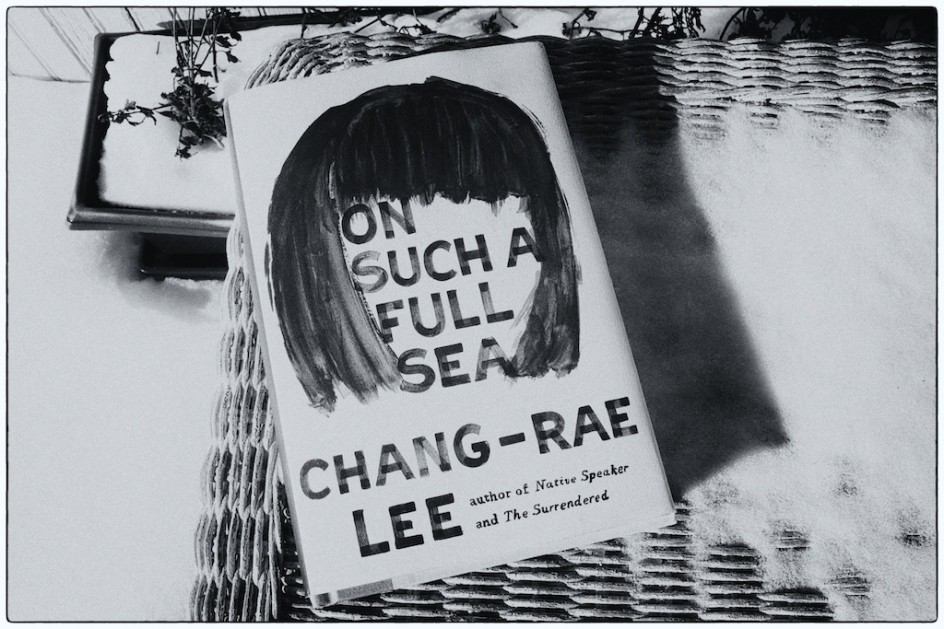
If you wish to purchase this book, please consider buying it from Battenkill Books, my local bookstore, a great independent bookstore. You can call the store at 518 677-7136 or visit them at www.battenkillbooks.com)
“On Such A Full Sea,” Chang-rae Lee’s daring excursion into the Dystopian genre, beloved by the young, the anxious and despairing, is my first Dystopian novel, and I gambled on Lee’s prodigious writing gifts (“Native Speaker,” “The Surrendered”) to make it worthwhile. It was. It is a wonderful book, beautifully and lyrically written. Lee joins Cormac McCarthy, Margaret Atwood, Dorris Lessing, Anthony Burgess and a slew of literary wannabees in imagining love, hope and betrayal in the future world.
I’ve always struggled with the rise of Dystopian fantasy, both in film and movies. It is really something of a cliche now – the future always imagined a polluted world, collapsed governments, vast settlements of savagery, poverty and desolation. I wonder when someone of real imagination will imagination the future in a more thoughtful and nuanced way.
Sometimes there are enclaves of civilization, sometimes not, government has collapsed, the earth has been ruined, innocents are savaged, it does not seem to me an especially imaginative way of looking at the future which is, of course, unknowable and unlikely to be as one-dimensional as the Dystopians imagine it to be. In “On Such A Full Sea,” Lee is more restrained – no laser-spouting robots, no zombies, mutants, savage killers on motorcyles, rampaging mobs and dangers in the night. There is, of course, some danger and some brutality, it is occasional and disturbing but not the focal point of the novel. For all his literary skill, Lee isn’t quite brave enough to concoct a radically different future than the Dystopian norm: – wild and unsettled lands beyond the settlements filled with creepy stuff.
“On Such A Full Sea’ takes place in a world that is not totally unfamiliar, but one whose major cities have long been made unlivable by environmental catastrophe, forcing whole societies to relocate along class lines. A collapsing America is re-colonized, this time the colonizers come from Asia. “Our people arrived from New China, truly ancient times,” the omniscient narrator tells us. There was very little in the way of an indigenous population for them to encounter or displace.
This one of the interesting sub-themes in Lee’s book, a subtle exploration of America’s great fear of a rising China, subtly but skillfully explored here. The novel’s 16-year-old protagonist is from B-mor, once known as Baltimore, in the old land. She is a diver in her relatively prosperous and comfortable labor settlement, she cares for the fish the settlement raises and sells to the wealthier “Charter” communities who are often stricken with mysterious diseases and are obsessed with their health and health care – a not-so-subtle invocation of present-day America. One day Fan’s lover Reg mysteriously disappears (presumably taken away by the never seen or described authorities to be examined for health reasons).
Fan poisons her fish and leaves her B-mor, setting out on into the lawless “counties” on her own in search of her lover. Her flight mesmerizes B-mor, sparks a sudden decline in the settlement’s fortunes. If there is a flaw in Lee’s quite wonderful book, is that Fan is so enigmatic. She doesn’t speak, she simply reacts, thinks, floats through the dangers and brutality and betrayal that is the real theme of the book. She doesn’t get mad, she doesn’t fight. Yet she is curiously strong and resilient. You get the sense early on that she can take care of herself, but without all of the histrionics, violence and drama that come with the genre.
The real narrator of the book is the collective “we” of the B-Mor community. Fan’s departure haunts and enthralls B-mor, even pushes them towards anger and rebellion. Like the reader, they struggle to figure her out, they are surprised by her. “The more we follow the turns of her journey, the more we realize that she is not quite the champion we would normally sing; she is not the heroine who wields the great sword…She is one of the ranks, this perfectly ordinary, exquisitely tiny person in whom we will reside, via both living and dreaming.” And that, of course, is what makes her so compelling.
This revelation is clear to the reader as well, Fan is not the hero of the “Hunger Games,” she is accepting, passive, silent throughout almost all of her journey into the world beyond sheltered B-mor. More than horror, she faces deceit betrayal, and seeks a way beyond it. Leaving B-mor, she sets out to find her brother, who tested his way out of B-mor and made it to one of the prized charter communities, although she doesn’t know where he is. She meets helpers and enemies along the way, one often is indistinguishable from the other.
This novel is a perfect introduction to the Dystopian genre for violence-shy lovers of literary fiction, or for people who just don’t always want to see the future in as narrow a way as most of the Dystopians do. One thing history teaches us is that we can’t know the future, we never do, it is beyond our imaginations.
Chang-rae Lee is one of the most skillful word smiths writing today, he is just a pleasure to read. I don’t think I’d care to venture too much further into the genre myself, but this is a book I can highly recommend. If you love the craft of Philip Roth, you will love Lee’s wonderful writing, explorations of mastery of quiet detail, human desire and frailty. There is also a touch of Marquez- like fantasticalism to make for a great read and a terrific book.
